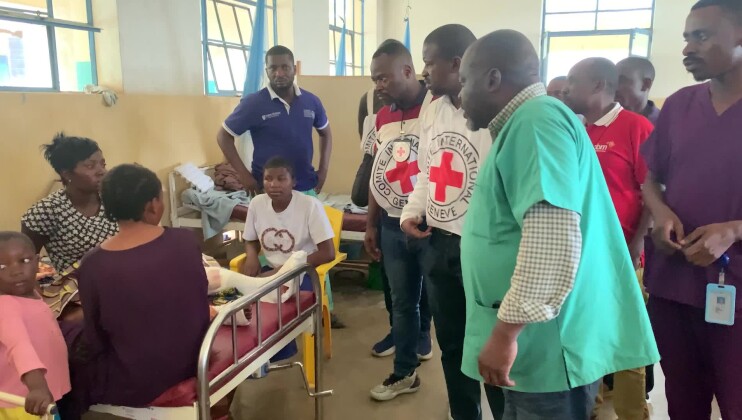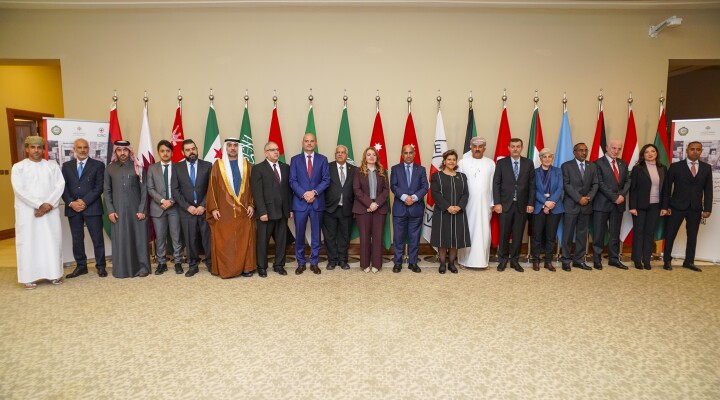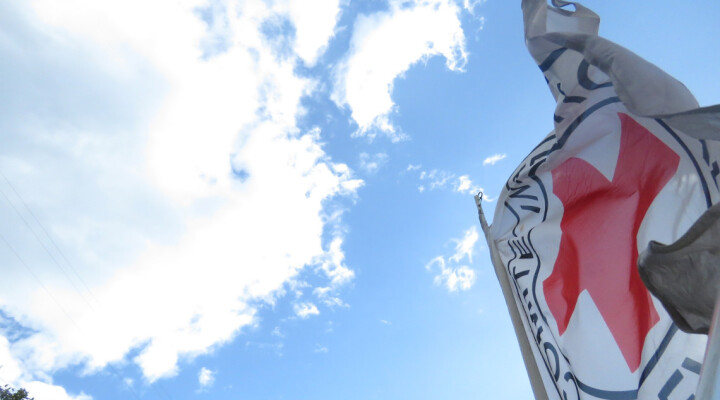Burkina Faso: Conflict aggravates ongoing food crisis
The Sahel region is being hit by the worst drought in over a decade, pushing more than 10.5million people into malnutrition. For Burkina Faso, the situation is particularly worrying as the country reels from the consequences of conflict that are severely aggravating the ongoing food crisis.
Violence has internally displaced over 1.8 million people, almost 10% of the country’s population, a number that keeps rising every day.
“A person of good will allows me to exploit this piece of land. But because of the lack of rain, the harvest is bad. Our fields in the village are more fertile than those here. There are pockets of drought here. The rains don't come.”
Larba Mathieu Yougbare was forced to flee his home and is now internally displaced in Fada N’gourma with his family. Crops he used to plant back home cannot survive in the dry environment he now finds himself in and he is barely able to produce enough food for his family. As the lean season comes in and people’s food stocks are depleted, the situation risks severely deteriorating.
80% of Burkina Faso’s population rely on agriculture for their livelihoods. Many of those displaced now rely on aid to survive.
15% of the population are currently food insecure in the country. Especially vulnerable are pregnant women and newborn children. Right now, 1 in 10 children in Burkina Faso are facing malnutrition. The compounding crises are pushing the healthcare system to the brink. Harouna Sawadgo, Chief Nurse at the CSPS in Fada has watched the situation evolve as thousands of internally displaced persons settled in the city in search of safety.
“We expected 221 cases of malnutrition in our health facility for the whole year. Today, in the space of three months, we have already reached 211 cases of malnutrition.”
Combined with the negative effects of climate change, the reality on the ground is a humanitarian crisis that fuels itself.
The ICRC together with its partners from the Red Cross Movement has scaled up its response across ten countries in Africa in order to assist those most vulnerable. In Burkina Faso, together with the Burkinabe Red Cross, the organization is providing emergency food and water, cash and support for basic services and aiming to recover the livelihoods of host communities and displaced persons. For Nilla Ouarme, who is internally displaced in Ouahigouya, the assistance came right on time.
“We fled our village without taking anything. We couldn't take shoes, hats, nothing. We find ourselves in food insecurity now. There's really no food. God willing, the ICRC assistance came. After receiving the money, first of all we are going to buy some food. It's food that keeps the human being going. After the food we'll see.”
SHOTLIST
Length: 08’55”
Location: Burkina Faso- Fada N’gourma, Ouahigouya
Date: April 2022
00:00:00 --> 00:00:15
Entrance to the city of Fada N'Gourma and traffic in the city (3 shots)
00:00:15 --> 00:00:28
Family yard of Larba Mathieu Yougbare and his wife, internally displaced in Fada (2 shots)
00:00:28 --> 00:00:42
Larba Mathieu Yougbare on a bicycle, daba on his shoulder (3 shots)
00:00:42 --> 00:00:57
Larba Mathieu Yougbare walks in his field and then stops to look at him (4 shots)
00:00:57 --> 00:01:07
View of Larba Mathieu Youngbare's field (2 shots)
00:01:07 --> 00:01:20
Larba Mathieu Youngbare weeding (2 shots)
00:01:20 --> 00:02:04 Soundbite of Larba Mathieu Yougbare, farmer and internally displaced
00:01:20 --> 00:01:25
We came here because we were forced to flee our village
00:01:25 --> 00:01:28
It is a person of good will who allows me to exploit this piece of land.
00:01:28 --> 00:01:31
But because of the lack of rain, the harvest is bad.
00:01:31 --> 00:01:34
Our fields in the village are more fertile than those here.
00:01:34 --> 00:01:38
There are pockets of drought here. The rains don't come until the end.
00:01:38 --> 00:01:44
The sorghum I planted did not resist and I had to plant cowpeas instead, without success.
00:01:44 --> 00:01:48
We harvested better when we were in our village.
00:01:48 --> 00:01:51
This is due to the fertility of the soil.
00:01:51 --> 00:01:54
Since I've been here it's not worth anything.
00:01:54 --> 00:01:59
The harvested cowpea does not exceed 15 kg. Same thing for sorghum.
00:01:59 --> 00:02:02
You can see the sorghum at home.
00:02:02 --> 00:02:04
It's always the ears that I put in bags.
00:02:04 --> 00:02:19
The farmer carries a bag of sorghum (millet) ears from his production and puts it in the yard (3 shots)
00:02:19 --> 00:02:30
Larba Mathieu Youngbare's wife prepares the family meal, the sorghum-based tô (2 shots)
00:02:30 --> 00:02:57
Larba Mathieu Youngbare's wife serves the meal to the whole family who start eating (4 shots)
00:02:57 --> 00:03:08
Outside view of the CSPS of Fada sector 11 (2 shots)
00:03:08 --> 00:03:13
Women with their babies enter the clinic for consultations
00:03:13 --> 00:03:29
Weighing of the children in the presence of their mothers and nurses (3 shots)
00:03:29 --> 00:03:35
Many women and their babies are waiting for their turn for the consultation
00:03:35 --> 00:03:45
Measurement of a baby's arm circumference (2 shots)
00:03:45 --> 00:03:50
A child in his mother's arms is eating some food supplement
00:03:50 --> 00:03:56
Harouna Sawadogo, Head Nurse, enters the CSPS sector 11 of Fada
00:03:56 --> 00:04:05
Harouna Sawadogo writing (2 shots)
00:04:05 --> 00:05:00 Soundbite Harouna Sawadogo, Head Nurse of the CSPS/ sector 11 of Fada
00:04:05 --> 00:04:12
To talk about the situation of malnourished people, we have a very high rate.
00:04:12 --> 00:04:19
It was expected 221 cases of malnutrition in our health facility for the whole year.
00:04:19 --> 00:04:28
Today, in the space of three months, we have already reached 211 cases of malnutrition.
00:04:28 --> 00:04:32
There are two reasons for this.
00:04:32 --> 00:04:44
There is the security issue that has caused people from the villages to rush to the city. There is a concentration here.
00:04:44 --> 00:04:52
There is the problem of hygiene and also many farmers have not been able to produce.
00:04:52 --> 00:05:00
All in all, all this has played negatively in the proper care of children.
00:05:00 --> 00:05:05
Nilla Ouarme goes to the registration site of the ICRC cash transfer beneficiaries in downtown Ouahigouya
00:05:05 --> 00:05:14
Nilla Ouarme queues up at the ICRC cash transfer registration site (2 shots)
00:05:14 --> 00:05:20
Nilla Ouarme receives the card that gives her access to the money
00:05:20 --> 00:05:25
Nilla Ouarme in the row ready to go in and get his money
00:05:25 --> 00:05:46
Nilla Ouarme presents his card and receives money (4 shots)
00:05:46 --> 00:06:21 Soundbite Nilla Ouarme, internally displaced beneficiary of the ICRC cash transfer program
00:05:46 --> 00:05:51
The history of our presence in Ouahigouya is linked to the irruption of armed groups.
00:05:51 --> 00:05:53
We fled our village without taking anything.
00:05:53 --> 00:05:56
We couldn't take shoes, hats, nothing.
00:05:56 --> 00:06:00
We are food insecure.
00:06:00 --> 00:06:03
There's really no food.
00:06:03 --> 00:06:09
God willing, the ICRC accompaniment came.
00:06:09 --> 00:06:15
After receiving the money, first of all we are going to buy some food.
00:06:15 --> 00:06:18
It's food that keeps the human being going.
00:06:18 --> 00:06:21
After the food we'll see.
00:06:21 --> 00:06:31
Nilla Ouarme goes to the grain market to buy corn (2 shots)
00:06:31 --> 00:06:52
Nilla Ouarme buys corn (4 shots)
00:06:52 --> 00:07:10 Soundbite Nilla Ouarme, internally displaced beneficiary of the ICRC cash transfer program
00:06:52 --> 00:06:58
I came to buy food. But when he told me about the prices, I found it expensive.
00:06:58 --> 00:07:03
I asked the price of the bag of corn, but it costs 29,000 CFA francs.
00:07:03 --> 00:07:10
Given its price, I preferred to buy some in the meantime.
00:07:10 --> 00:08:08 Soundbite Patrick Youssef, Regional Director for Africa, ICRC
00:07:10 --> 00:07:23
The most affected countries are countries that are in armed conflict and that sometimes cyclically experience climatic shocks as we have seen in Burkina Faso, in Mali with floods or droughts as in the Horn of Africa.
00:07:23 --> 00:07:55
The real problem today is a series of failures of other systems that have unfortunately led to a food crisis: for example, no action or very little action on adaptation to climate change, so climate funding that unfortunately does not reach the places that have to face as in Somalia, or Mali or in the Sahel countries to climate hazards, drought, the advancing desert and unfortunately find no solution.
00:07:55 --> 00:08:08
In contexts of armed conflict, in contexts affected by cyclical crises of violence, we also see a lack of investment in basic services: water and sanitation services, protection of populations.
For more information, please contact:
Halimatou Amadou, ICRC Dakar, tel: +221 78 186 46 87
Tarek Wheibi, ICRC Niamey, tel: +227 828 112 71



